英语八年级上册Unit 9 Can you come to my party?Section A Grammar Focus-3c 课件(共有PPT27张)
文档属性
| 名称 | 英语八年级上册Unit 9 Can you come to my party?Section A Grammar Focus-3c 课件(共有PPT27张) | 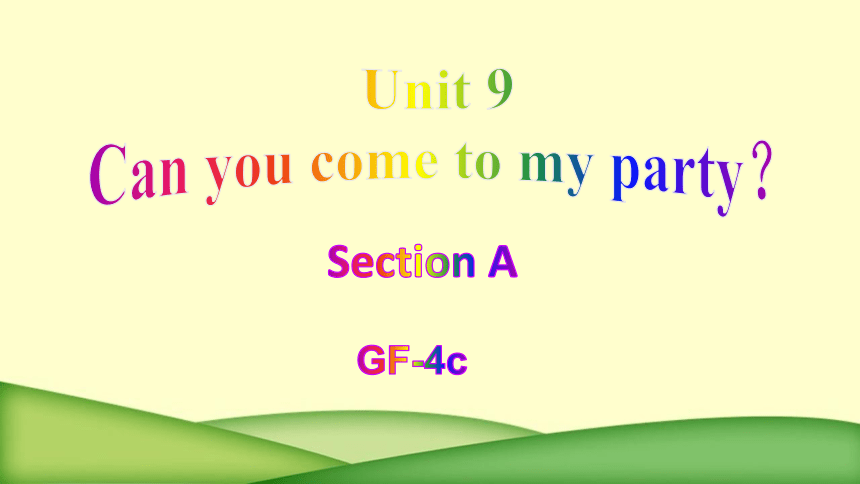 | |
| 格式 | pptx | ||
| 文件大小 | 342.1KB | ||
| 资源类型 | 教案 | ||
| 版本资源 | 人教新目标(Go for it)版 | ||
| 科目 | 英语 | ||
| 更新时间 | 2021-12-13 19:16:59 | ||
图片预览

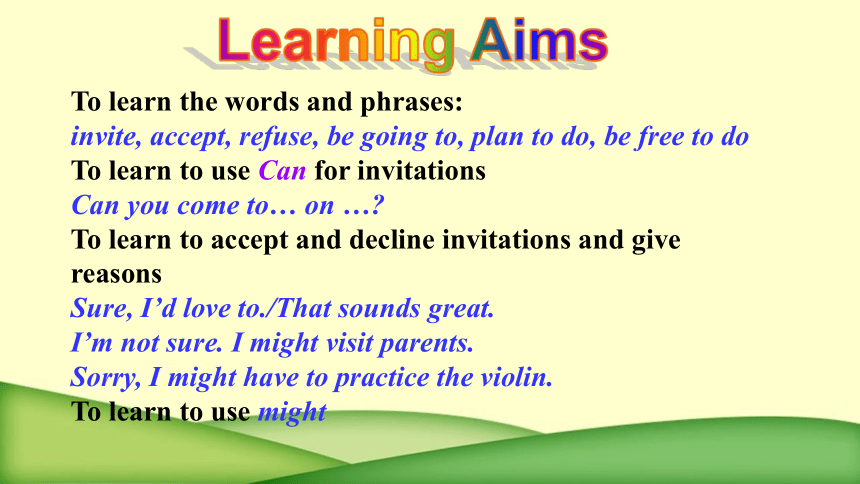
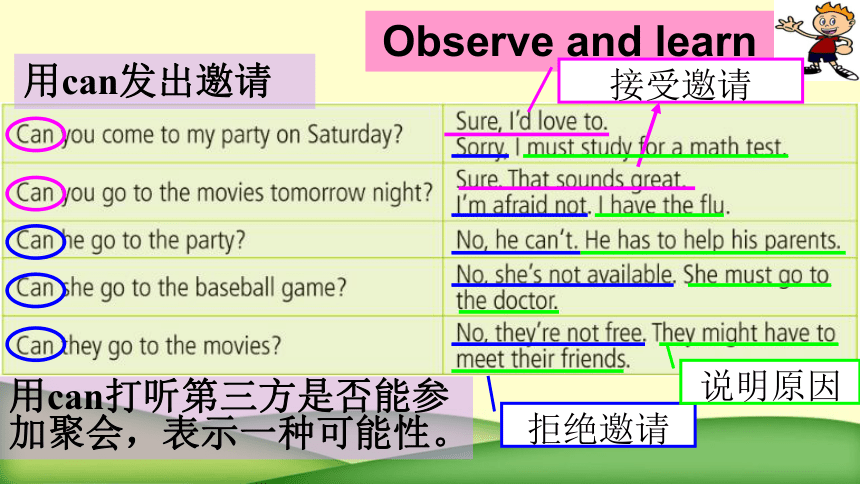
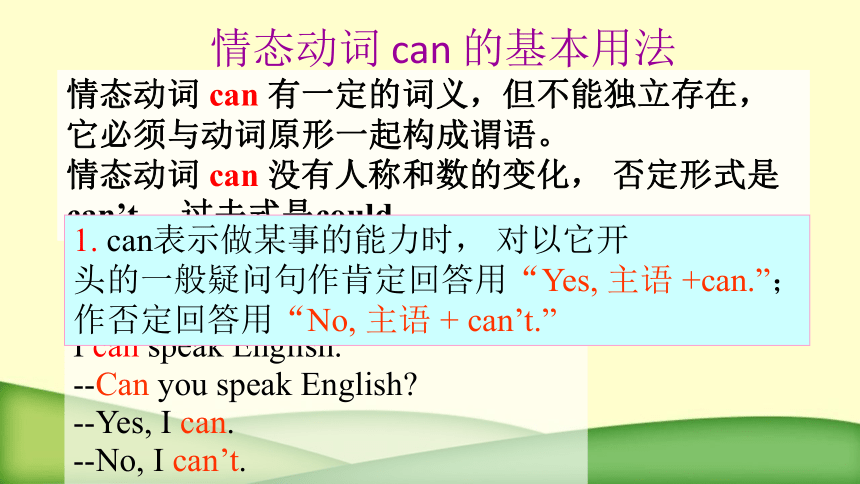
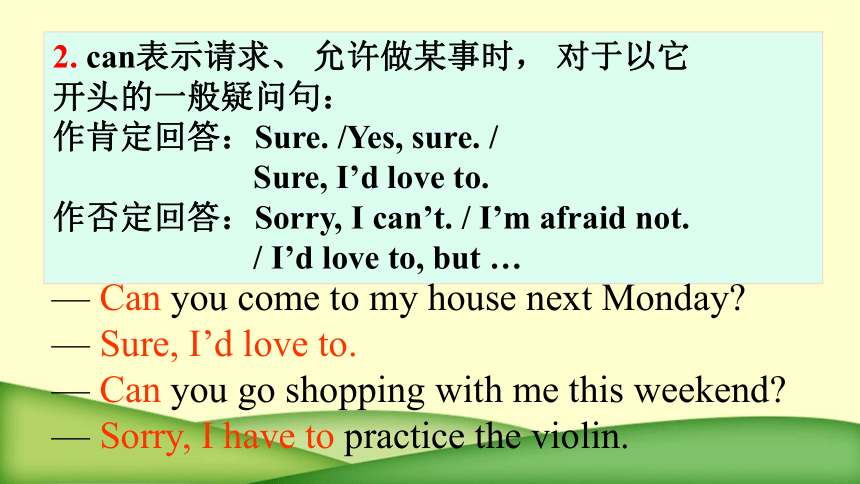
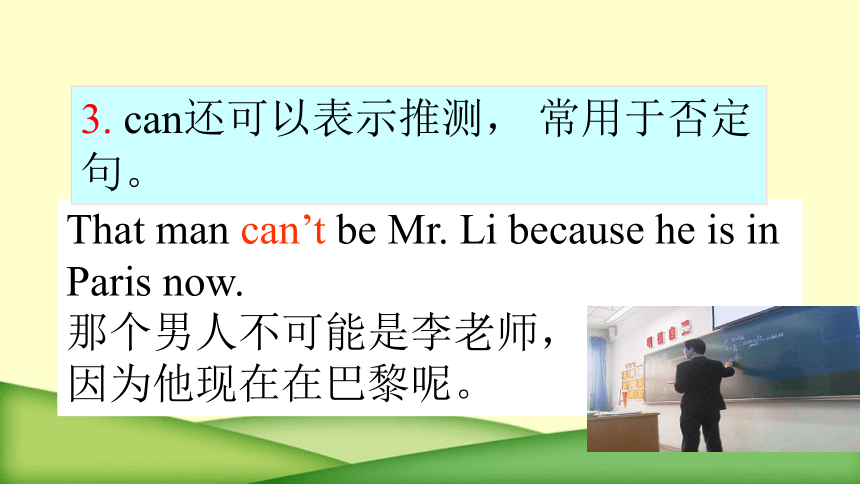
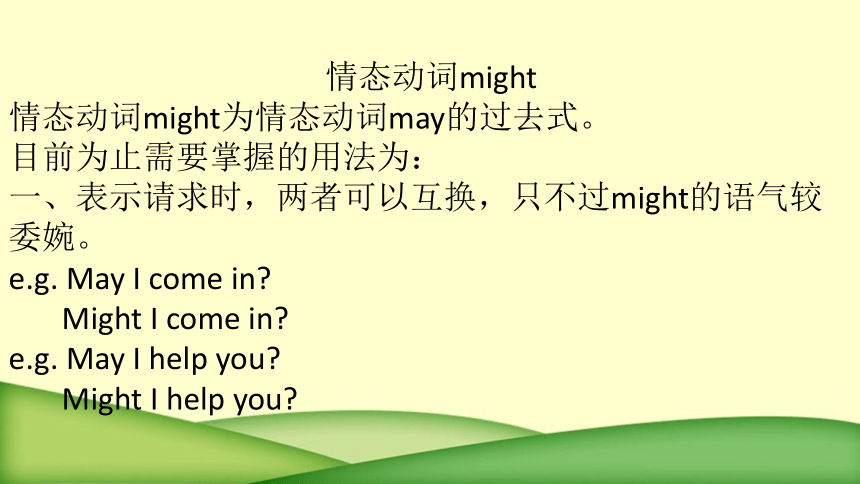
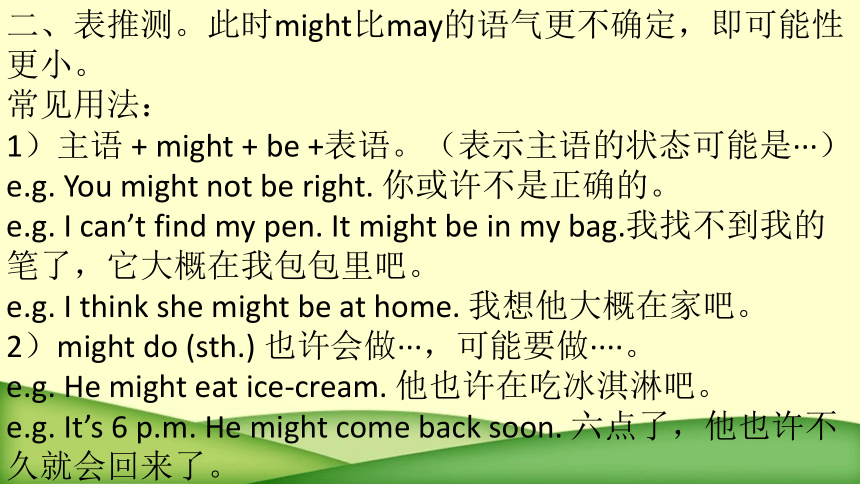
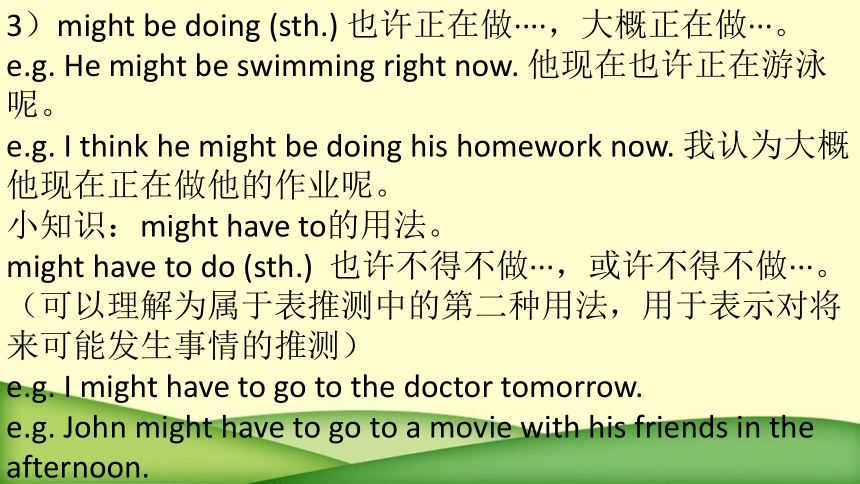
文档简介
(共27张PPT)
Section A
GF-4c
Unit 9
Can you come to my party?
Learning Aims
To learn the words and phrases:
invite, accept, refuse, be going to, plan to do, be free to do
To learn to use Can for invitations
Can you come to… on …
To learn to accept and decline invitations and give reasons
Sure, I’d love to./That sounds great.
I’m not sure. I might visit parents.
Sorry, I might have to practice the violin.
To learn to use might
Observe and learn
用can发出邀请
用can打听第三方是否能参加聚会,表示一种可能性。
接受邀请
拒绝邀请
说明原因
情态动词 can 有一定的词义,但不能独立存在,它必须与动词原形一起构成谓语。
情态动词 can 没有人称和数的变化, 否定形式是can’t, 过去式是could。
I can speak English.
--Can you speak English
--Yes, I can.
--No, I can’t.
1. can表示做某事的能力时, 对以它开
头的一般疑问句作肯定回答用“Yes, 主语 +can.”; 作否定回答用“No, 主语 + can’t.”
情态动词 can 的基本用法
2. can表示请求、 允许做某事时, 对于以它
开头的一般疑问句:
作肯定回答:Sure. /Yes, sure. /
Sure, I’d love to.
作否定回答:Sorry, I can’t. / I’m afraid not.
/ I’d love to, but …
— Can you come to my house next Monday
— Sure, I’d love to.
— Can you go shopping with me this weekend
— Sorry, I have to practice the violin.
That man can’t be Mr. Li because he is in Paris now.
那个男人不可能是李老师, 因为他现在在巴黎呢。
3. can还可以表示推测, 常用于否定句。
情态动词might
情态动词might为情态动词may的过去式。
目前为止需要掌握的用法为:
一、表示请求时,两者可以互换,只不过might的语气较委婉。
e.g. May I come in
Might I come in
e.g. May I help you
Might I help you
二、表推测。此时might比may的语气更不确定,即可能性更小。
常见用法:
1)主语 + might + be +表语。(表示主语的状态可能是···)
e.g. You might not be right. 你或许不是正确的。
e.g. I can’t find my pen. It might be in my bag.我找不到我的笔了,它大概在我包包里吧。
e.g. I think she might be at home. 我想他大概在家吧。
2)might do (sth.) 也许会做···,可能要做····。
e.g. He might eat ice-cream. 他也许在吃冰淇淋吧。
e.g. It’s 6 p.m. He might come back soon. 六点了,他也许不久就会回来了。
3)might be doing (sth.) 也许正在做····,大概正在做···。
e.g. He might be swimming right now. 他现在也许正在游泳呢。
e.g. I think he might be doing his homework now. 我认为大概他现在正在做他的作业呢。
小知识:might have to的用法。
might have to do (sth.) 也许不得不做···,或许不得不做···。(可以理解为属于表推测中的第二种用法,用于表示对将来可能发生事情的推测)
e.g. I might have to go to the doctor tomorrow.
e.g. John might have to go to a movie with his friends in the afternoon.
watch TV, on the weekend, my cousin,
visit my grandparents, practice the violin
1. A: What are you going to do on Saturday
B: I’m not sure. I might __________.
2. A: What are you planning to do after
school
B: I don’t know. ______________________.
3a
Practice
Complete the answers with might and one of the phrases in the box.
watch TV
I might practice the violin
3. A: When will you finish the science homework
B: ______________________________.
4. A: Who are you going to the movies with
B: __________________________.
5. A: Are you free to come to my place on Saturday
B: ________________________________.
I might finish it on the weekend
I might go with my cousin
Sorry. I might visit my grandparents
1. Inviting: ___________________________
(can/play tennis)
Accepting: ________________________
2. Inviting: ______________________________
(would like to/go to the movies)
Refusing: _____________________
Reasons: ________________________________
(might have to) ________
3b
Can you play tennis with us
Sure. I’d love to.
Would you like to go to the movies
I’m afraid I can’t.
I might have to prepare for the math
exam.
3. Inviting: _____________________________
(can/hang out with us tonight)
Refusing: __________________________
I must help my mom at home.
Can you hang out with us tonight
Sorry. I can’t.
Reason: ___________________________ (must)
4. Inviting: ___________________________
__________________________ (would like to / come to my birthday party)
Accepting: _________________________
Would you like to come to my
birthday party
Sure. I’d love to.
to sp.
1. invite sb.
to do sth.
e.g. Invite three students to you party. (P65)
My friend invites me to her big house.
I invited Jim to play basketball today.
2. accept & refuse
Write down everything you have to do next week. Choose a day and time to have a party. Then invite classmates to your party.
3c
Group work
A: 你能来参加我的聚会吗?
B: 什么时候?
A: 下周,在周四晚上。
B: 很抱歉。我不得不为数学考试学习。
Can you come to my party
When is it
Next week, on Thursday night.
I’m sorry.
I have to study for a math test.
1. invite v. 邀请
◆invite sb. to sth.意为“邀请某人参加 ……;邀请某人到……”。如:
I’m going to invite my friends to my party this Sunday.
◆invite sb. to do sth. 意为“邀请某人做某 事”。如:
The young man invited me to sing just now.
Language points
【链接】invite的名词形式是invitation。
与invitation相关的短语有:
make an invitation 发出邀请
accept an invitation 接受邀请
turn down / refuse/ decline an invitation拒绝邀请
【运用】
Ⅰ. 单项选择
—Why are you so excited
—Nancy invited me _____ on a trip to Dongjiang Lake just now.
A. to go B. go C. going
A
1) I don’t know if Lily will refuse.
refuse vt. 拒绝某人/某物,拒绝做某事
2) The strange man always refuses others’ advice.
refuse + n.
3) Why didn’t you refuse her
refuse + pron.
4) John’s father refused to stop drinking.
refuse + to do sth.
5) Tina can’t refuse him anything.
refuse + double-object
2. refuse v. 拒绝
【运用】
请将下列汉语句子译成英语。
我拒绝了王丽的邀请。
2) 李敏不喜欢王磊,所以拒绝了他。
3) 你最好不要拒绝帮助别人。
I refused Wang Li’s invitation.
Li Min didn’t like Wang Lei, so she refused him.
You’d better not refuse to help others.
3. accept v. 接受
e.g. They didn’t accept his money.
他们没有接受他的钱。
Accept 和 receive
accept和receive都用作动词,意思相近,但用法有所区别。accept意为“接受”,强调主观接受。receive意为“收到;接到”,强调客观收到,但并不意味着同意接受。如:
Ann didn’t accept her friend’s present yesterday.
I received a letter from my aunt from Canada.
【运用】
将下列句子翻译成英语。
1) 昨天下午那位著名的电影明星收到了很多花吗?
2) 她决定接受这份工作。
3) 我收到汤姆送我的一本字典,但我没接受。
Did that famous film star receive many flowers yesterday afternoon
She decided to accept this job.
I received a dictionary from Tom, but I didn’t accept it.
我都 学会了!
本课句型
Summary
Today we have learnt how to say “yes” or “no” to someone’s invitation and give a reason.
1) Can you… 常用于发出邀请。
2) Sure, I’d love to. 这是对邀请的肯定回答,表示接受邀请。
Sure用于口语,表示接受邀请,相当于Certainly, yes。
3) Sorry, I can’t是对邀请的否定回答。
1.She wants to play outside,but she ______ finish her homework first.
A.might B.must C.can D.could
2.I ________ stop eating fast food because it's not good for health.
A.can B.may C.have to D.should
3.—_______ you play the piano
—Yes,of course.
A.Must B.Have to C.May D.Can
B
C
D
Exercises
一、单项选择题
4.I can look after myself.You ________ worry about me any more.
A.mustn't B.don't have to C.may be D.need
5.The children ________ play football on the road.
A.can't B.can C.mustn't D.must
6.They ________ work very hard when they were young.
A.had to B.must C.should D.have to
B
C
A
二、按要求完成下列句子。
1.They can go to the tennis game.(改为一般疑问句)
______________ go to the tennis game
2.Can you play soccer with me this afternoon?(作肯定回答)
Sure, _________________ .
3.Can she go there by taxi?(作否定回答)
No, _______________ .
Can they
I'd love to
she can't
4.The boy can't swim now.(同义句转换)
The boy isn't ________________ now.
5.They can come to our school on Tuesday.(对画线部分提问)
______________ they come to your school
able to swim
When can
Homework
Thanks a lot for your invitation. I’m very busy this week. I ___________________________________________________________________________________________________________________________________________________________________________
你的朋友约你去看电影,请根据你的日程表,写下你这一周要做的事,并找一个时间和你的朋友去看电影.
开头已给出:
Thank you !
Section A
GF-4c
Unit 9
Can you come to my party?
Learning Aims
To learn the words and phrases:
invite, accept, refuse, be going to, plan to do, be free to do
To learn to use Can for invitations
Can you come to… on …
To learn to accept and decline invitations and give reasons
Sure, I’d love to./That sounds great.
I’m not sure. I might visit parents.
Sorry, I might have to practice the violin.
To learn to use might
Observe and learn
用can发出邀请
用can打听第三方是否能参加聚会,表示一种可能性。
接受邀请
拒绝邀请
说明原因
情态动词 can 有一定的词义,但不能独立存在,它必须与动词原形一起构成谓语。
情态动词 can 没有人称和数的变化, 否定形式是can’t, 过去式是could。
I can speak English.
--Can you speak English
--Yes, I can.
--No, I can’t.
1. can表示做某事的能力时, 对以它开
头的一般疑问句作肯定回答用“Yes, 主语 +can.”; 作否定回答用“No, 主语 + can’t.”
情态动词 can 的基本用法
2. can表示请求、 允许做某事时, 对于以它
开头的一般疑问句:
作肯定回答:Sure. /Yes, sure. /
Sure, I’d love to.
作否定回答:Sorry, I can’t. / I’m afraid not.
/ I’d love to, but …
— Can you come to my house next Monday
— Sure, I’d love to.
— Can you go shopping with me this weekend
— Sorry, I have to practice the violin.
That man can’t be Mr. Li because he is in Paris now.
那个男人不可能是李老师, 因为他现在在巴黎呢。
3. can还可以表示推测, 常用于否定句。
情态动词might
情态动词might为情态动词may的过去式。
目前为止需要掌握的用法为:
一、表示请求时,两者可以互换,只不过might的语气较委婉。
e.g. May I come in
Might I come in
e.g. May I help you
Might I help you
二、表推测。此时might比may的语气更不确定,即可能性更小。
常见用法:
1)主语 + might + be +表语。(表示主语的状态可能是···)
e.g. You might not be right. 你或许不是正确的。
e.g. I can’t find my pen. It might be in my bag.我找不到我的笔了,它大概在我包包里吧。
e.g. I think she might be at home. 我想他大概在家吧。
2)might do (sth.) 也许会做···,可能要做····。
e.g. He might eat ice-cream. 他也许在吃冰淇淋吧。
e.g. It’s 6 p.m. He might come back soon. 六点了,他也许不久就会回来了。
3)might be doing (sth.) 也许正在做····,大概正在做···。
e.g. He might be swimming right now. 他现在也许正在游泳呢。
e.g. I think he might be doing his homework now. 我认为大概他现在正在做他的作业呢。
小知识:might have to的用法。
might have to do (sth.) 也许不得不做···,或许不得不做···。(可以理解为属于表推测中的第二种用法,用于表示对将来可能发生事情的推测)
e.g. I might have to go to the doctor tomorrow.
e.g. John might have to go to a movie with his friends in the afternoon.
watch TV, on the weekend, my cousin,
visit my grandparents, practice the violin
1. A: What are you going to do on Saturday
B: I’m not sure. I might __________.
2. A: What are you planning to do after
school
B: I don’t know. ______________________.
3a
Practice
Complete the answers with might and one of the phrases in the box.
watch TV
I might practice the violin
3. A: When will you finish the science homework
B: ______________________________.
4. A: Who are you going to the movies with
B: __________________________.
5. A: Are you free to come to my place on Saturday
B: ________________________________.
I might finish it on the weekend
I might go with my cousin
Sorry. I might visit my grandparents
1. Inviting: ___________________________
(can/play tennis)
Accepting: ________________________
2. Inviting: ______________________________
(would like to/go to the movies)
Refusing: _____________________
Reasons: ________________________________
(might have to) ________
3b
Can you play tennis with us
Sure. I’d love to.
Would you like to go to the movies
I’m afraid I can’t.
I might have to prepare for the math
exam.
3. Inviting: _____________________________
(can/hang out with us tonight)
Refusing: __________________________
I must help my mom at home.
Can you hang out with us tonight
Sorry. I can’t.
Reason: ___________________________ (must)
4. Inviting: ___________________________
__________________________ (would like to / come to my birthday party)
Accepting: _________________________
Would you like to come to my
birthday party
Sure. I’d love to.
to sp.
1. invite sb.
to do sth.
e.g. Invite three students to you party. (P65)
My friend invites me to her big house.
I invited Jim to play basketball today.
2. accept & refuse
Write down everything you have to do next week. Choose a day and time to have a party. Then invite classmates to your party.
3c
Group work
A: 你能来参加我的聚会吗?
B: 什么时候?
A: 下周,在周四晚上。
B: 很抱歉。我不得不为数学考试学习。
Can you come to my party
When is it
Next week, on Thursday night.
I’m sorry.
I have to study for a math test.
1. invite v. 邀请
◆invite sb. to sth.意为“邀请某人参加 ……;邀请某人到……”。如:
I’m going to invite my friends to my party this Sunday.
◆invite sb. to do sth. 意为“邀请某人做某 事”。如:
The young man invited me to sing just now.
Language points
【链接】invite的名词形式是invitation。
与invitation相关的短语有:
make an invitation 发出邀请
accept an invitation 接受邀请
turn down / refuse/ decline an invitation拒绝邀请
【运用】
Ⅰ. 单项选择
—Why are you so excited
—Nancy invited me _____ on a trip to Dongjiang Lake just now.
A. to go B. go C. going
A
1) I don’t know if Lily will refuse.
refuse vt. 拒绝某人/某物,拒绝做某事
2) The strange man always refuses others’ advice.
refuse + n.
3) Why didn’t you refuse her
refuse + pron.
4) John’s father refused to stop drinking.
refuse + to do sth.
5) Tina can’t refuse him anything.
refuse + double-object
2. refuse v. 拒绝
【运用】
请将下列汉语句子译成英语。
我拒绝了王丽的邀请。
2) 李敏不喜欢王磊,所以拒绝了他。
3) 你最好不要拒绝帮助别人。
I refused Wang Li’s invitation.
Li Min didn’t like Wang Lei, so she refused him.
You’d better not refuse to help others.
3. accept v. 接受
e.g. They didn’t accept his money.
他们没有接受他的钱。
Accept 和 receive
accept和receive都用作动词,意思相近,但用法有所区别。accept意为“接受”,强调主观接受。receive意为“收到;接到”,强调客观收到,但并不意味着同意接受。如:
Ann didn’t accept her friend’s present yesterday.
I received a letter from my aunt from Canada.
【运用】
将下列句子翻译成英语。
1) 昨天下午那位著名的电影明星收到了很多花吗?
2) 她决定接受这份工作。
3) 我收到汤姆送我的一本字典,但我没接受。
Did that famous film star receive many flowers yesterday afternoon
She decided to accept this job.
I received a dictionary from Tom, but I didn’t accept it.
我都 学会了!
本课句型
Summary
Today we have learnt how to say “yes” or “no” to someone’s invitation and give a reason.
1) Can you… 常用于发出邀请。
2) Sure, I’d love to. 这是对邀请的肯定回答,表示接受邀请。
Sure用于口语,表示接受邀请,相当于Certainly, yes。
3) Sorry, I can’t是对邀请的否定回答。
1.She wants to play outside,but she ______ finish her homework first.
A.might B.must C.can D.could
2.I ________ stop eating fast food because it's not good for health.
A.can B.may C.have to D.should
3.—_______ you play the piano
—Yes,of course.
A.Must B.Have to C.May D.Can
B
C
D
Exercises
一、单项选择题
4.I can look after myself.You ________ worry about me any more.
A.mustn't B.don't have to C.may be D.need
5.The children ________ play football on the road.
A.can't B.can C.mustn't D.must
6.They ________ work very hard when they were young.
A.had to B.must C.should D.have to
B
C
A
二、按要求完成下列句子。
1.They can go to the tennis game.(改为一般疑问句)
______________ go to the tennis game
2.Can you play soccer with me this afternoon?(作肯定回答)
Sure, _________________ .
3.Can she go there by taxi?(作否定回答)
No, _______________ .
Can they
I'd love to
she can't
4.The boy can't swim now.(同义句转换)
The boy isn't ________________ now.
5.They can come to our school on Tuesday.(对画线部分提问)
______________ they come to your school
able to swim
When can
Homework
Thanks a lot for your invitation. I’m very busy this week. I ___________________________________________________________________________________________________________________________________________________________________________
你的朋友约你去看电影,请根据你的日程表,写下你这一周要做的事,并找一个时间和你的朋友去看电影.
开头已给出:
Thank you !
同课章节目录
- Unit 1 Where did you go on vacation?
- Section A
- Section B
- Unit 2 How often do you exercise?
- Section A
- Section B
- Unit 3 I'm more outgoing than my sister.
- Section A
- Section B
- Unit 4 What's the best movie theater?
- Section A
- Section B
- Unit 5 Do you want to watch a game show?
- Section A
- Section B
- Unit 6 I'm going to study computer science.
- Section A
- Section B
- Unit 7 Will people have robots?
- Section A
- Section B
- Unit 8 How do you make a banana milk shake?
- Section A
- Section B
- Unit 9 Can you come to my party?
- Section A
- Section B
- Unit 10 If you go to the party, you'll have a grea
- Section A
- Section B
